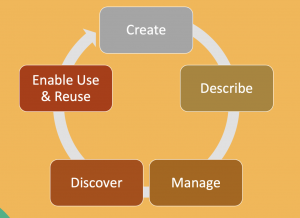4 Scorecard (worksheet)
Worksheet
The following is a worksheet which can be used to examine the case study included in this resource. The full worksheet is also available as a Google Doc to be edited, adapted or shared.
Using the following table, examine a traditional knowledge collection to identify the presence of community involvement for each item in the scorecard. Guiding questions are presented after each stage in the lifecycle to help guide the examination. Document the evidence of the community considerations that you found. If you find no evidence of community considerations, make suggestions for improvement.
Description of the Digital Content Lifecycle:

Create:
Content is put into a form that makes it usable
Describe:
Content is described so that it can be found
Manage:
Decisions are made which ensure future access to content
Discover:
Content is findable within the system
Enable Use and Reuse:
Clarifying how people can use the digital content (copyright)
Definition of Cultural Context
| Stage of the Digital Content Lifecycle | Yes | No | Evidence of Community Consideration
If not present, add suggestions, or consider reasons it is not present. |
CreateAre file formats usable on the equipment the community members might use to access the database? How is quality assured? How does digitization capture the value? What is the value? And to whom is it valued? Where did this collection originate and has its digitization been vetted with the community? |
|||
DescribeWhich metadata is used? Does it align with the value of the community? Would it have the same meaning to the community as it does to users of the database? Who is allowed to edit the metadata? |
|||
ManageAre policies available related to access to the collection? Which classification is chosen and is it meaningful to the community? |
|||
DiscoverIs the community able to access the collection? How will they know the collection is available? What training is needed to use the collection? Will natural language searches (that a community member might use) retrieve results? |
|||
Use and ReuseWhat are the policies for reuse of the information in the database? Have cultural heritage, copyright or creative commons labels been applied? Do they need to be? |

